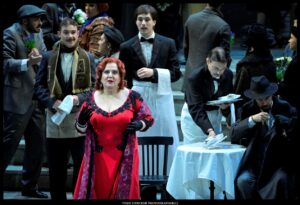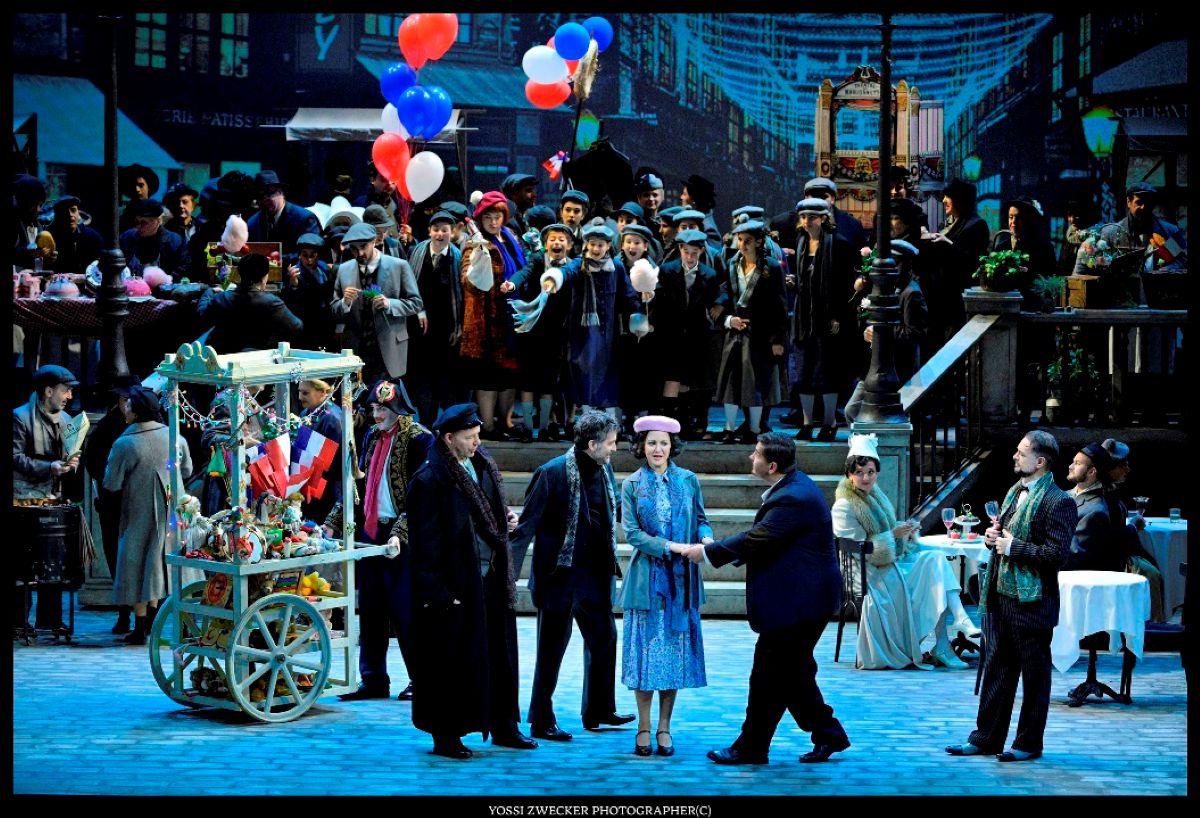directorial liberties—nor should it. Puccini’s tale of starving artists in 1830s Paris is best served with a faithful touch. The late Michael Hampe’s production, first staged at the Cologne Opera in 2015, subtly shifts the setting to a later period—Musetta arrives in a 1930s car and later dons black trousers—but remains, at its core, a classic interpretation.
The handsome, realistic sets at the front of the stage are enhanced by photographic backdrops—Paris’s skyline in Act I, a bustling Latin Quarter street in Act II. Yet, in fleeting, magical moments, these give way to dreamlike Chagall-inspired paintings, mirroring the emotions of the lovers, Mimì and Rodolfo. On opening night, the sets drew spontaneous applause as they emerged from darkness, manoeuvred by stagehands in full view of the audience. It was a moment reminiscent of the ovation earned by the elaborate Latin Quarter set in Franco Zeffirelli’s legendary (and far more lavish) 1981 production.
At its heart, La bohème tells two contrasting love stories. The first, between the poet Rodolfo and the fragile seamstress Mimì, is a tragic one—her worsening tuberculosis casting a shadow over their romance. Rodolfo, consumed by jealousy, treats her cruelly. But is his possessiveness mere insecurity, or a misguided attempt to shield himself from inevitable heartbreak? In contrast, the fiery, on-again-off-again relationship between Musetta and Marcello injects humour and levity into the opera. Musetta, initially painted as a coquettish schemer, ultimately emerges as its most compelling character—free-spirited, warm-hearted, and selflessly devoted to Mimì in her final moments.

Ukrainian tenor Valentyn Dytiuk, who first appeared at the Israeli Opera in 2018 as Pinkerton in Madama Butterfly, delivers his fifth Tel Aviv performance as Rodolfo. His voice—sweet, powerful, and seemingly effortless in its upper register—ranks among the finest to grace the house. Yet his acting lacks depth; the intensity of Rodolfo’s love for Mimì never fully materialises. In contrast, soprano Alla Vasilevitsky, a mainstay of the Tel Aviv Opera, is superb as always. Her voice, pure and expressive, brims with emotion, though she appears a touch too healthy for the ailing Mimì.
Italian baritone Mario Cassi brings both vocal richness and fiery energy to Marcello, while soprano Yael Levita impresses as Musetta. At first glance, she may not fit the traditional image of the irresistible seductress who commands attention with every step—a quality central to Musetta’s famous Waltz (“Quando me’n vo”). Yet, with her luminous voice and infectious charm, she soon makes the role her own.
Act II is further enlivened by the presence of The Israeli Opera Chorus, joined by The Young Efroni Choir. The children’s voices add vibrancy to the bustling street scene, their singing both precise and joyful. Meanwhile, conductor Carlo Montanaro leads the orchestra with accuracy, though a certain emotional restraint lingers. “One should never wish to fall into melodramatic undertones”, says one of the characters in Antonioni’s film L’Avventura. This claim is mostly true, but I felt that in this case just a little bit of if wouldn’t have hurt.
The Israeli Opera Tel-Aviv-Yafo האופרה הישראלית תל-אביב-יפו
Music by Giacomo Puccini
Director: Michael Hampe
Revival Co-Directors: Eike Ecker, Regina Alexandrovskaya
Set and Costume Designer: Germán Droghetti
Conductor: Carlo Montanaro
Sung in Italian with Hebrew and English surtitles
Cast includes Valentyn Dytiuk, Alla Vasilevitsky, Yael Levita, Mario Cassi
Running time: 2.5hrs including interval
Photo credit: Yossi Zwecker

